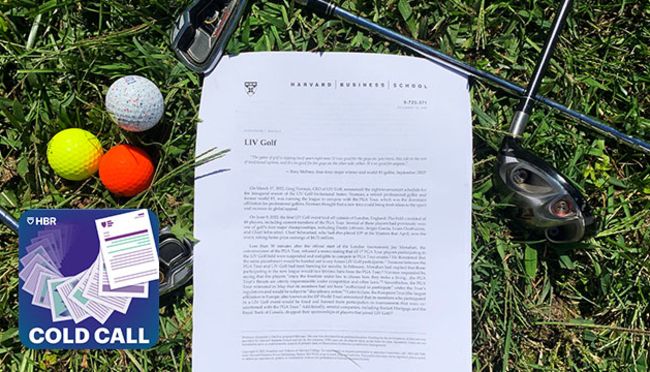
- 22 Feb 2024
- Research & Ideas
How to Make AI 'Forget' All the Private Data It Shouldn't Have
When companies use machine learning models, they may run the risk of inadvertently sharing sensitive and private data. Seth Neel explains why it’s important to understand how to wipe AI’s spongelike memory clean.
.jpg)
- 10 Oct 2023
- Research & Ideas
In Empowering Black Voters, Did a Landmark Law Stir White Angst?
The Voting Rights Act dramatically increased Black participation in US elections—until worried white Americans mobilized in response. Research by Marco Tabellini illustrates the power of a political backlash.

- 26 Sep 2023
- Cold Call Podcast
The PGA Tour and LIV Golf Merger: Competition vs. Cooperation
On June 9, 2022, the first LIV Golf event teed off outside of London. The new tour offered players larger prizes, more flexibility, and ambitions to attract new fans to the sport. Immediately following the official start of that tournament, the PGA Tour announced that all 17 PGA Tour players participating in the LIV Golf event were suspended and ineligible to compete in PGA Tour events. Tensions between the two golf entities continued to rise, as more players “defected” to LIV. Eventually LIV Golf filed an antitrust lawsuit accusing the PGA Tour of anticompetitive practices, and the Department of Justice launched an investigation. Then, in a dramatic turn of events, LIV Golf and the PGA Tour announced that they were merging. Harvard Business School assistant professor Alexander MacKay discusses the competitive, antitrust, and regulatory issues at stake and whether or not the PGA Tour took the right actions in response to LIV Golf’s entry in his case, “LIV Golf.”
- 01 Nov 2019
- What Do You Think?
Should Non-Compete Clauses Be Abolished?
SUMMING UP: Non-compete clauses need to be rewritten, especially when they are applied to lower-income workers, respond James Heskett's readers. Open for comment; 0 Comments.

- 13 May 2019
- Working Paper Summaries
The Changing Landscape of Auditor Litigation and Its Implications for Audit Quality
Data from 1996 to 2016 shows that shareholder litigation against auditors has declined in recent years. Empirical evidence shows that Rule 10b-5, the Securities Act statute used for class action lawsuits, has lost its bite for use against auditors. This decline is driven, at least in part, by the US Supreme Court’s narrowing of liability standards. These findings suggest weakened shareholder protection with profound implications for investors.

- 15 Jan 2019
- Working Paper Summaries
The Creation and Evolution of Entrepreneurial Public Markets
Since 1990, new stock exchanges geared toward fast-growing, entrepreneurial companies have proliferated around the world. This analysis shows that exchanges in countries with better shareholder protection allowed younger and less profitable companies to raise more capital. These markets alone cannot boost entrepreneurial activity but need enabling institutions.

- 08 Nov 2017
- Research & Ideas
Handgun Waiting Periods Prevent Hundreds of Homicides Each Year
Waiting-period laws reduce gun-related homicides by 17 percent and gun-related suicides by up to 11 percent, according to a study by Deepak Malhotra, Michael Luca, and Christopher Poliquin. Open for comment; 0 Comments.

- 17 Jul 2016
- Working Paper Summaries
Tort Reform and Innovation
This paper investigates how tort reforms might affect the development of new medical device technologies. The authors find that caps on non-economic damages (such as pain and suffering) are associated with an average decline in patenting for medical instrument technologies. The effect, however, is highly varied and depends on the characteristics of both the devices and the medical fields.
- 22 Feb 2016
- Research & Ideas
The ‘Mother of Fair Trade’ was an Unabashed Price Protectionist
Historian Laura Phillips Sawyer unearths the story of little-known drug store owner Edna Gleason who, in a man’s world, helped fire a progressive movement to protect small-business owners from price-slashing chains. Open for comment; 0 Comments.

Why Companies Should Share Their DEI Data (Even When It’s Unflattering)
Companies that make their workforce demographics public earn consumer goodwill, even if the numbers show limited progress on diversity, says research by Ryan Buell, Maya Balakrishnan, and Jimin Nam. How can brands make transparency a differentiator?